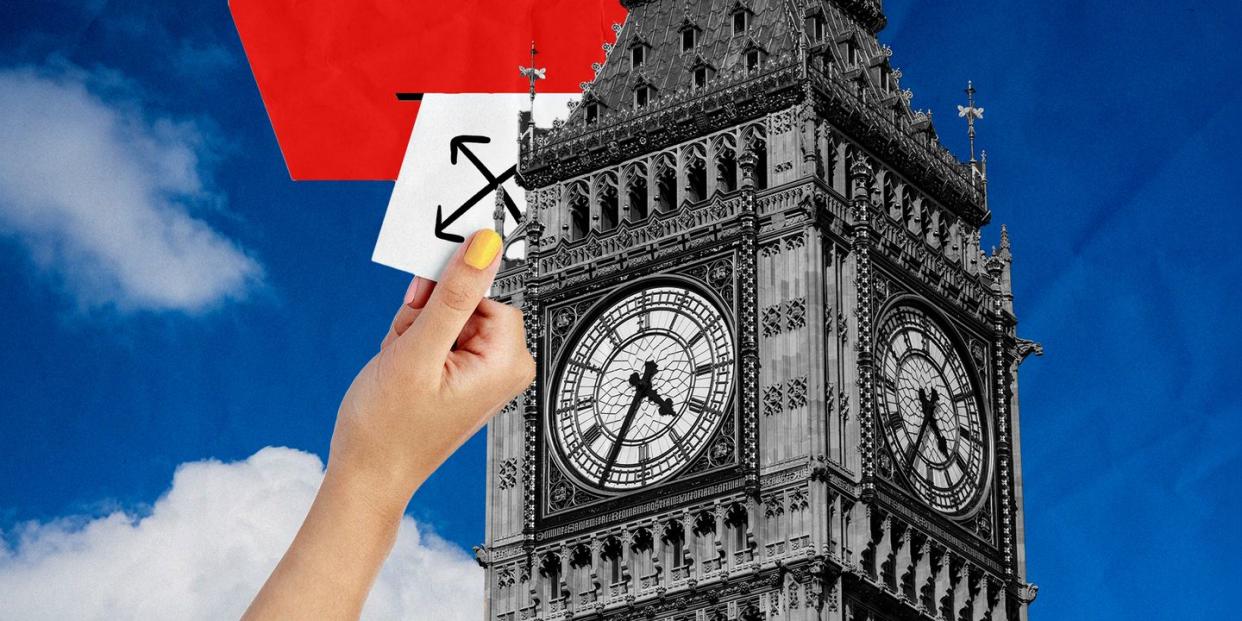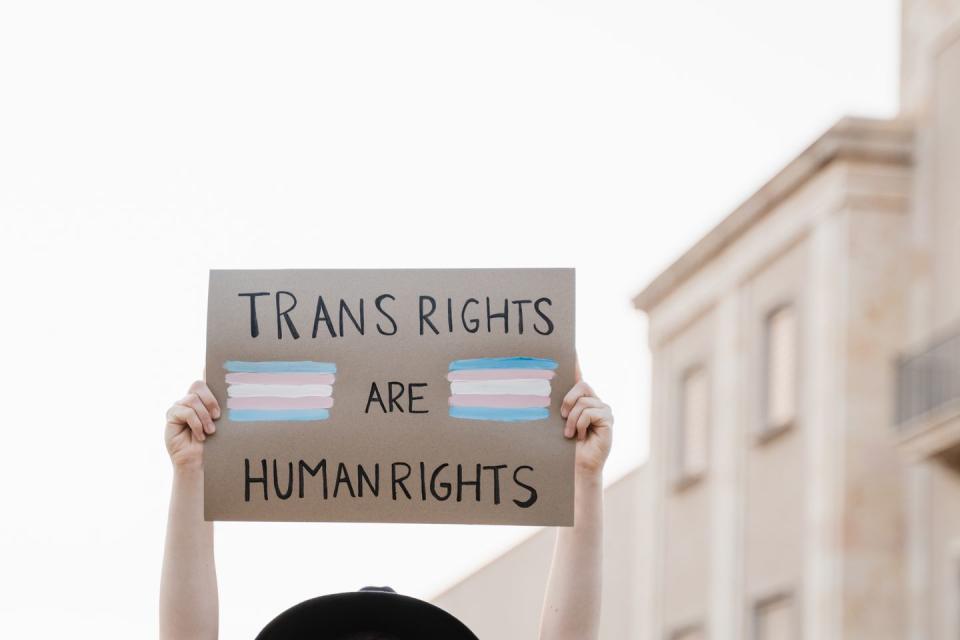General Election 2024: We read every manifesto - here's what each political party is promising

Unless you’ve been living under a rock (and to be honest, we’re quite enviable if you have), you’ll have heard that Rishi Sunak has called a general election which has seen all political parties ramping up their campaigns and promises on what they’d do if in charge of the country for the next parliament.
While ballot papers will have numerous parties on them, including Nigel Farage’s Reform and various independents, we all know this is (likely to be) a two-horse race for Number 10. When it comes to selecting our next PM, the contest is between the incumbent Conservative leader Rishi Sunak back at the helm, or Keir Starmer for Labour.
Ed Davey, the leader of the Liberal Democrats (who you may have seen waterskiing or paddleboarding during the campaign trail) is another choice, as well as Green Party co-leaders Carla Denyer and Adrian Ramsay.
But aside from some of the more headline grabbing policies (ie: bringing back national service, cutting taxes – or raising them) it can be hard to boil down what exactly each political party is offering us if they win.
If you’re unsure of who to vote for and want to cut through the noise of debates, interviews and cringey photo opps, then Cosmopolitan UK has rounded up what each major political party is offering the public on key issues, should they be handed the keys to 10 Downing Street come 5th July.
Maternity and Childcare
British childcare is among the most expensive in the world, so parents will be looking closely at each party’s promises here. In recent months, we’ve heard how women are having abortions due to the extortionate price of childcare, with the average cost of sending a child under two to nursery reaching over £15,000 a year. So, what’s being promised?
Conservatives
The Conservatives are pledging to increase the free childcare allowance for eligible parents of two-year-olds from 15 hours (first introduced by the PM in April this year), to 30 hours for eligible parents of children between nine months and school starting age, in Sept 2025. They say this will save families an average of £6,900 a year.
They are also proposing changes to the Child Benefits system, measuring the amount of overall household incomes as opposed to individual salaries. Now, families will have to earn over £120,000 before their child benefits are reduced. The Conservatives claim this will see over 700,000 families gaining on average £1,480 extra a year.
The recent inquiry in birth care in the UK found maternity care provided in this country to be ‘shockingly poor’. To counter this, the Conservatives vow to create a comprehensive strategy for maternity care, as well as creating more funding for maternal safety, with postnatal appointments now checking both on the welfare of new mothers as well as their babies.
Finally, the Tories aim to introduce a ‘Family Hub’ in every authority across England. These hubs will offer support for issues such as breastfeeding and provide antenatal care.
Labour
The Labour Party has supported the measures introduced by the Conservatives, and previously pledged to maintain the new free childcare hours should they win the election.
They also pledge to expand the country’s childcare and early-years system and will open 3,000 more nurseries. They say these plans will be paid for by charging VAT on private school fees.

While the UK’s maternity leave pay is low compared to other countries (statutory maternity pay is given for only 39 out of 52 weeks), Labour now promises to review the parental leave system within the first year of government.
In response to poor maternity care, Labour plans to train thousands more midwives as part of the NHS Workforce plan and to close the maternal mortality gap for Black and Asian expectant mothers.
Labour also wants to fight to strengthen rights to equal pay and protections from maternity and menopause discrimination and sexual harassment. They’re also hoping to reduce the gender pay gap, as well as introducing the Race Equality Act, to enshrine in law the full right to equal pay for Black, Asian, and other ethnic minority people, strengthen protections against dual discrimination and root out other racial inequalities
Liberal Democrats
The Liberal Democrats have focused on making parents more financially stable. Their manifesto pledges nearly doubling Statutory Maternity and Shared Parental Pay from £184.03 to £350 a week. They also vow to prove a ‘Toddler Top-up’ to Child Benefits after a child turns one.
Meanwhile, the Lib Dems want to provide fathers and partners more time to bond with their children, and have pledged to extend paternity care for an extra month at 90% pay.
Green
If elected, the Green Party are hoping to abolish the two-child benefit cap, which they claim will lift 250,000 children out of poverty. They also hope to raise all legacy benefits by £40 a week.
Reform
According to the Reform manifesto (but contradictory from actual research), “The majority of mothers would choose to stay at home more if they could.” They now plan to ‘front-load’ the Child Benefit system for children aged 1-4 which will allow parents to ‘spend more time with their children’. No actual figures or data have been provided for this.
Violence against women and girls
With rape convictions in England and Wales having reached historic lows, and the worrying rise of misogyny, we’ve reached a critical point in our fight to stop violence against women and girls. But how are political parties promising to tackle the issue?
Conservatives
Despite voting against making misogyny classed as a hate crime in 2021, the Tories have promised a raft of tougher measures against those perpetuating violence against women and girls.
New measures pledged include all domestic murderers (people who have murdered their partners) to have minimum prison sentences set at 25 years. Meanwhile, life imprisonment without parole will be mandatory for the most prolific or dangerous offenders.
The Conservatives also vow to stop all rapists and others found guilty of serious sexual assaults from being eligible for early release, while sex offenders will also be blocked from changing their names following a conviction.
Labour
The Labour Party is focusing on cutting the backlog for survivors of rape and sexual assault, and looks to make the process of reporting to the police less traumatic. Their 2024 manifesto pledges that Labour will add specialist rape and sexual offences teams in every police force, and will fast-track rape cases with new, specialist courts across England and Wales.
Women in abusive relationships will also be offered more support, with domestic abuse experts on-hand in 999 control rooms, and women who live in cohabiting couples will see their rights and protections strengthened.
As well as strengthening the laws that were created as part of the Online Safety Act, Labour is pledging further protection against stalkers including giving women the right to know the identity of online stalkers.
Finally, Labour pledges to overhaul the way sex education is taught, with schools to now address misogyny and teach young people about healthy relationships and consent.
While it is not a pledge in their manifesto, Labour ministers have said during debates they want to make misogyny a hate crime.
Liberal Democrats
The Liberal Democrats have similar proposals to the Labour Party concerning violence against women and girls, as they also want to embed domestic abuse specialists in every police force and 999 operator assistance centre, as well as strengthen the Online Safety Act.

However, they go further with some of their plans. The Lib Dems vow to draw up an urgent plan to tackle ongoing reports of sexism, racism and homophobia in the Metropolitan Police, which would see the force adopt the recommendations of the Baroness Casey Review. They have also pledge to implement a Women’s Justice Board, which would provide specialist training for all staff in contact with women in the criminal justice system.
Lastly, the Lib Dems vow to make misogyny a hate crime.
Green
Should they be elected, the Green Party will launch a ‘campaign to end violence against women and girls’ - they have also vowed to make misogyny a hate crime (but have not pledged it in their manifesto).
Reform
There are no actual policies surrounding violence against women and girls in Reform’s 28-page manifesto. They do pledge to have ‘more bobbies on the beat’ and put an end to ‘woke’ policing - scrapping all Diversity, Equality and Inclusion (DE&I) roles and regulations to stop two-tier policing.
Cost of Living and the Economy
With fuel bills having rocketed in the last few years, 3.1 million people in the UK resorting to food banks, and the price of groceries remaining steep, sorting out the nation’s finances is high on many people’s priorities lists. So who is pledging what to help our bank balances feel healthier?
Conservatives
The Conservative Party has previously announced measures to help with soaring costs, such as the cap on energy bills. In their 2024 manifesto, they explain their hope to maintain the energy price cap and pledge to keep reviewing charges to keep bills low. In a bid to make homes warmer in cold months, the Tories plan to invest £6 billion over the next three years to insulate properties.

They also pledge to continue to cut National Insurance contributions to just 6% by April 2025, leading to a total tax cut of £1,350 for the average worker on £35,000. Meanwhile, around 4 million self-employed people will no longer pay self-employed National Insurance.
Labour
In order to help low-income families, Labour has pledged to review Universal Credit, remove age bands for minimum wage and introduce free breakfast clubs in every primary school.
Meanwhile, they plan to bring down the cost of energy bills by introducing the nationalised clean energy service, Great British Energy, as well as taxing non-doms
Liberal Democrats
Similarly to both Labour and the Conservative manifestos, the Liberal Democrats also want to pour money into investing in a Home Energy Upgrade programme to make properties better insulated. They’re also keen to tackle rising food prices through a National Food Strategy.
However, the Lib Dems have also announced plans to rejoin the European Union’s single market in their manifesto and want to expand the EU’s Youth Mobility Scheme - allowing young people up to the age of 35 the chance to settle and work in EU countries for three years without paying any visa fees.
The Liberal Democrats hope to impose a one-off windfall tax on the super-profits of oil and gas producers and traders.
Green
The Green Party has offered a string of reforms for lower paid workers, wanting to increase the minimum wage to £15 an hour regardless of what you warn. Similarly to Labour’s proposals, the Greens want better rights for those working in the ‘gig economy’ and want to ban zero-hour contracts.
However, their proposals also want to move towards a four-day working week, as well as eventually introducing a universal basic income.
To pay for this, the Green Party are calling for a Wealth Tax of 1% on assets above £10 million and of 2% on assets above £1bn. They also want to remove the Upper Earnings Limit that restricts the amount of National Insurance paid by high earners.
Reform
Without explaining how or why, Reform pledges to ‘reform the tax code system’, and lift the cap on income tax to £20,000 a year.
They also want to cut energy taxes, which they say will save households over £500 per year.
Housing
The UK is currently in the grips of a housing crisis, with Britain having had the worst decade of housebuilding since World War Two. The shortage of housing has meant house prices have rocketed, and deposits are hard to afford – the average deposit needed for a London house is £144,500. Meanwhile, a study of over 4,000 renters by housing charity Shelter found unaffordable rents, poor living conditions and the risk of eviction are causing a quarter of tenants to feel hopeless, while other participants had been made ‘physically ill’ by their housing as a result of mould, damp and other health concerns. So how is each political party planning to tackle this?
Conservatives
The Conservatives has pledged to build 1.6 million new homes in England in the next five years, which will be achieved by building on urban, brownfield land and forming new communities in major cities across the UK.
To help first time buyers on the property ladder, the Tories are going to raise value of houses that require stamp duty (the tax on buying a home) to be paid from 300,000 to £425,000. They also plan to launch a new Help to Buy scheme which provides first-time buyers with an equity loan of 20% towards the cost of a new build home, and introduce 5% deposit mortgages.
If you’re currently renting, Sunak pledges he will finally make changes, despite the Renters Reform Bill failing to pass through the last government.
This includes ending Section 21 ‘No Fault’ evictions, but also strengthening other grounds for landlords to evict tenants accused of anti-social behaviour in the first year.
Labour
The Labour manifesto promises to ‘get Britain building again’, pledging to build 1.5 million new homes (slightly fewer than the Conservative pledge) to create ‘a generation of new towns’, with building social rental housing being a priority. Labour has vowed to end the leasehold system and ensure commonhold is the default tenure.
For renters, Labour, like the Tories, promises to abolish Section 21 ‘no fault evictions’, and vow that private tenancies will have to adhere to ‘Awaab’s Law’: landlords have to follow strict time limits to address dangerous hazards such as damp and mould in their properties.
Liberal Democrats
In their extensive manifesto, the Lib Dems promise: to build 380,000 new homes a year, 150,000 of which being social housing. Similarly, no fault evictions will be banned immediately for private renters, while a ‘national register for landlords’ would be implemented, with private tenancy agreements will set to three years as a default.
Green
In line with their climate-friendly ethos, the Green Party’s plans for housing include ensuring all new homes meet Passivhaus (an energy efficient standard) or equivalent standards and house builders include solar panels and heat pumps on all new homes, where appropriate.

Similarly to Labour, the Greens aim to provide 150,000 new social homes every year. And they’re also backing fairer rental rights like the other parties by looking to implement rent controls and ending no fault evictions.
Reform
While they pledge to fast-track building homes on brownfield sites, the Reform manifesto does not specify how many houses they would aim to build a year. They are the most landlord-friendly manifesto, pledging to scrap the Renters Reform Bill and restoring landlords’ rights to deduct finance costs and mortgage interest from tax on rental income.
NHS
It’s widely accepted that the NHS is in crisis – waitlists are huge (an estimated 7.5 million people are awaiting treatment, figures from February 2024 show), mental health services are hugely overstretched. Here’s how each party plans to handle our health service.
Conservatives
Announcing a substantial raft of measures, the Conservatives say they will ‘commit to the NHS Long-Term Workforce plan’. This includes expanding the Pharmacy First scheme, which enables your local pharmacy to treat some common conditions with prescription-only medicines without having to visit your GP.
The Tories also plan to invest £3.4 million in new technology for the NHS: this includes making the NHS App the main port of call for anyone trying to access the health service, and using AI to free up doctors and nurses’ time for frontline patient care.
And while it was previously promised in Boris Johnson’s 2019 Conservative manifesto, Sunak has once again pledged to build 40 more hospitals across the UK.
Mental health services are set to be overhauled by the Conservatives. They plan to expand coverage of Mental Health Support Teams to cover 100% of schools in England by 2030, and open early support hubs for those aged 11-25 in every local community within the same timeframe.
The Conservatives want to expand talking therapies by 50%, and the capacity of Individual Placement and Support for Severe Mental Illness by 140,000 places.
Tweakments and non-surgical cosmetic treatments are going to be overhauled. The Conservatives pledge to introduce a new licensing scheme for providers and age limits for those undergoing procedures.
Labour
The Labour Party also promises an NHS overhaul. Labour leader Keir Starmer has called for the return of ‘the family doctor’ by incentivising GPs to see the same patients, and creating 40,000 more appointments a week – some created by granting more pharmacists independent prescribing rights where clinically appropriate. Labour also wants to implement Neighbourhood Health Centres, by bringing together existing services under one roof.
Labour’s plan to modernise the NHS will come under the ‘New Hospitals Programme’, which looks to rebuild and modernise hospitals, as well as creating a new, modern booking system to guarantee appointments.
Labour also has a focus on mental health, planning to ‘bring waiting times down’ and provide interventions earlier. This will be achieved by recruiting an additional 8,500 new staff, and opening the Young Futures hubs will provide open access mental health services for children and young people in every community.
Liberal Democrats
The Liberal Democrats are prioritising cutting wait times for appointments, and pledges that everyone should receive an appointment within seven days of requesting one, or within 24 hours if urgent. They also vow to make prescriptions for people with chronic mental health conditions free on the NHS.

The Lib Dems have vowed to extend access to young people’s mental health services: should they win the election, young people’s mental health services will accessible until 25.
They also pledge to boost cancer survival rates, and promise to guarantee all of those diagnosed can start treatment within 62 days of referral.
Green
To tackle the crisis facing the NHS, the Green Party pledge a year-on-year reduction in waiting lists, as well as guaranteed rapid access to a GP and same day access in case of urgent need.
The Greens also offer an immediate boost to the pay of NHS staff, including the restoration of junior doctors’ pay, to help with staff retention.
Elected Greens will support a change in the law to legalise assisted dying for people suffering from terminal disease who wish to avoid prolonged unnecessary suffering.
Reform
Farage’s party plans to end frontline NHS staff from paying basic rate tax for three years, and write off student fees for doctors, nurses and medical staff after 10 years’ service.
They also pledge that NHS Patients will receive a voucher for private treatment if they can’t see a GP within three days, whereas for a consultant it would be three weeks, and an operation, nine weeks.
They have previously suggested a 'French style' healthcare system - where medical treatment and tests are partially paid for by the government, but the patient is responsible for the remaining amount.
Climate
The climate crisis is something that concerns young voters in particular – one survey shows 49% of UK residents aged between 16 to 25 are either ‘very worried’ or ‘extremely worried’ about climate change. And it’s an increasingly pressing problem with huge, overarching consequences: between 2030 and 2050, climate change is expected to cause approximately 250,000 additional deaths per year worldwide. So how will each political party plan to tackle it?
Conservatives
Having previously watered down commitments to carbon neutrality, The Conservative Party manifesto is now calling for a ‘pragmatic’ transition to net zero.
While the Conservatives are investing in cleaner power sources, such as trebling offshore wind capacity, scaling up to using more nuclear power and investing £1.1 billion into Green industries, there is still reliance on more polluting power sources; the Conservative save vowed to build new gas power stations to ‘maintain a safe and reliable energy source’.
Labour
With Great British Energy one of their key manifesto points, Labour vows to pursue cleaner energy and push Britain to reach net zero. Their ambitious pledges include doubling use of onshore wind, tripling solar power and quadrupling offshore wind power by 2030, as well as investing £500 million to support the manufacturing of green hydrogen.
Labour also wants the UK to be a leader on the world’s stage when it comes to tackling the climate crisis by creating the Clean Power Allience: a coalition of countries at the cutting edge of climate action.
Meanwhile, the party looks to raise money to fund its ambitious aims by closing the loopholes in windfall tax on oil and gas companies.
Elsewhere, Labour will also launch ‘The Warm Homes Plan’, which will offer grants and low interest loans to support investment in insulation and other improvements such as solar panels. Starmer is also calling to ensure homes in private rented sector meet minimum energy efficiency standards by 2030.
Labour wants the nation on the whole to be greener, and to improve access to green spaces. They pledge to create nine new National River Walks, establish three new national Forests in England, and to plant millions of trees to create new woodland.
Liberal Democrats
Similarly to Labour, the Lib Dems want to make homes warmer and cheaper to heat, and if elected, will launch an emergency upgrade programme where heat pumps will be installed for free for those on lower incomes. As part of their pledge to build 380,000 new homes a year, the Lib Dems vow all new builds will be zero carbon.
Homeowners will also be encouraged to try solar panels by offering incentives, such as a guaranteed fair price for electricity sold back to the grid.
Meanwhile, the Lib Dems want to invest in renewable power so that 90% of the UK’s electricity is generated from renewables by 2030, and aim for the country to reach net zero by 2045.
Green
Protecting the environment from climate change is the Green Party’s raison d’etre. Should they be elected, they propose a significant number of measures to cut climate emissions and make the UK cleaner and greener.
As well as investing a staggering £40 billion into the green economy over the next five years, the Greens pledge to implement a carbon tax to stop the UK from relying to fossil fuels.
Elsewhere, the Greens would introduce a ‘Rights of Nature Act’, which gives rights to nature itself. There will be additional taxes on people classed as ‘frequent flyers’, while the Greens would ban domestic flights for journeys that would take less than three hours by train.

The Green Party would want to nationalise all railway companies, eater companies and leading energy companies, as well as adopting an objective of 50% of all trips in England to be walked, wheeled or cycled.
Reform
The least climate friendly party, Reform aims to scrap Net Zero, and wants the UK to focus on fast-track licences of North Sea gas and oil. They also want to grant shale gas licences on test sites for two years.
LGBTQ+ rights
While it was David Cameron’s former Conservative government that introduced the Same Sex Marriage Act in 2013, conversations around LGBTQ+ rights have become increasingly fraught in recent years, with discussions around transgender identity being a key point of contention in the culture wars.
Conservatives
The Tories have pledged to rewrite the Equality Act, to clarify that sex in law means biological sex. This is in line with Health Secretary Steve Barclay’s plans to ban trans women being from female hospital wards.
The Conservatives have also pledged that schools will be issued with guidance for teachers on how to ‘best support’ children and teenagers questioning their gender. Parents will be given the right to know if their children want to change their gender identity.
Despite previous commitments to ban conversion therapy, the Conservative Party’s 2024 manifesto shows that they will no longer be pursuing a ban.
Labour
The Labour Party pledges to make all existing strands of hate crime an aggravated offence, as well as delivering a full, trans-inclusive ban on conversion therapy or practices.
Labour also promises to ‘modernise and reform; the gender recognition law to a new process. They have also committed to implement recommendations of the Cass review (review of gender identity services in NHS England).
Like the Conservatives, Shadow Health Secretary Wes Streeting has previously claimed he would follow in Conservative footsteps by banning trans women being treated in same sex wards. While they haven’t committed to changing the Equality Act, Labour pledges to uphold the act and support single-sex exceptions.
Labour aims to commission a new HIV action plan in England, in pursuit of ending HIV cases by 2030.
Liberal Democrats
While the Lib Dems also commit to a ban on conversion therapy, they promise to champion the Human Rights Act, as well to ‘respect and defending the rights of people of all sexual orientations and gender identities, including trans and non-binary people.’
Green
Green MPs will work towards no more HIV transmissions by 2030, advocating for a joined-up evidence-based approach, including access to the HIV prevention pill online, in pharmacies and from GP services, and renewing successful opt-out HIV testing programmes in A&Es in all areas with a high prevalence of HIV.
Their manifesto also pledges a campaign for the right of self-identification for trans and non-binary people.
Reform
With their manifesto attacking ‘woke’ ideology, Reform pledges ‘to ban transgender ideology in primary and secondary schools’, and wants to prohibit any gender questioning, social transitioning or pronoun swapping.

They hope to scrap the 2010 Equality Act and leave the European Convention on Human Rights. Reform also pledges to mandate for single-sex spaces in public toilets and changing areas.
You Might Also Like

 Yahoo News
Yahoo News 
